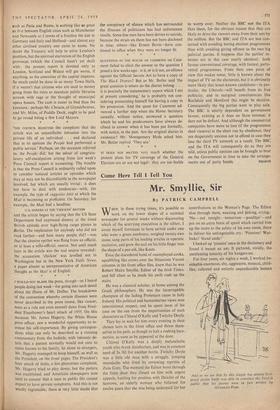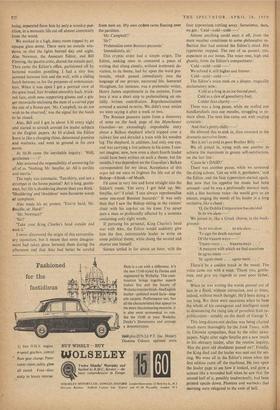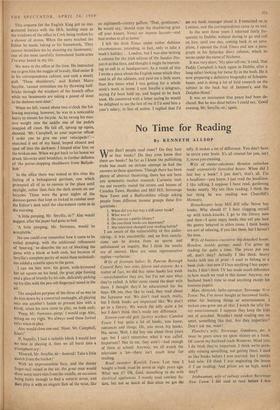Come Here Till I Tell You
Mr. Smyllie, Sir
By PATRICK CAMPBELL
WHEN, in these trying times, it's possible to work on the lower slopes of a national newspaper for several weeks without discovering which of the scurrying executives is the editor, I count myself fortunate to have served under one who wore a green sombrero, weighed twenty-two stone, sang parts of his leading articles in operatic recitative, and grew the nail on his little finger into the shape of a pen nib, like Keats.
Even the disordered band of unemployed cooks, squabbling like crows over the Situations Vacant columns in the front office files, knew that he was Robert Maire Smyllie, Editor of the Irish Times, and fell silent as he made his swift rush up the stairs.
He was a classical scholar, at home among the Greek philosophers. He was the incorruptible champion of the fading Protestant cause in holy Ireland. His political and humanitarian views won international respect, and he spent most of his time on the run from the importunities of such characters as Chloral O'Kelly and Twitchy Doyle.
They lay in wait for him every evening in their chosen lairs in the front office and threw them- selves in his path, as though to halt a rushing loco- motive, as soon as he appeared at the door.
Chloral O'Kelly was a deeply melancholic youth who drank disinfectant, and was in constant need of 3s. 9d. for another bottle. Twitchy Doyle was a little old man with a straggly, jumping moustache who lived by reviewing reprints of Zane Grey. The moment the Editor burst through the front door they closed on him with urgent appeals, battling for position with Deirdre of the Sorrows, an elderly woman who believed for twelve years that she was being underpaid for her contributions to the Woman's Page. The Editor shot through them, weaving and jinking, crying: 'No —not ton ight — tomorrow — goodbye'— and put on an extra burst of speed which carried him up the stairs to the safety of his own room, there to deliver his unforgettable cry: 'Pismires! War- locks! Stand aside!'
I looked up 'pismire' once in the dictionary and found it meant an ant. It pictured, vividly, the unrelenting tenacity of his hangers-on.
For four years, six nights, a week, I worked be- side*this enormous, shy, aggressive, musical, child- like, cultured and entirely unpredictable human
'And so we see that by this simple but almost fool- proof device Swift was able to convince the English public that his poems were in fact written by Alexander Pope. . .
being, separated from him by only a wooden par- tition, in a monastic life cut off almost completely from the world.
We worked in a high, dusty room topped by an opaque glass dome. There were no outside win- dows, so that the lights burned day and night. Alec Newman, the Assistant Editor, and Bill Fleming, the theatre critic, shared the outside part. Then came the Editor's office, partitioned off by battered wooden panelling. I had a tiny box jammed between him and the wall, with a sliding hatch between us for the purposes of communica- tion. When it was open I got a portrait view of the great head, hair brushed smoothly back, brick- red face, snub nose supporting glasses and a gin- ger moustache enclosing the stem of a curved pipe the size of a flower-pot. 'Mr. Campbell, we do not wish to be observed,' was the signal for the hatch to be closed.
Alec, Bill and I got in about 9.30 every night and started to scratch around for leader subjects in the English papers. At 10 o'clock the Editor burst in like a charging rhino, denounced pismires and warlocks, and went to ground in his own room.
At 10.30 came the inevitable inquiry : 'Well, gentlemen ?'
Alec assumed the responsibility of answering for all of us. 'Nothing, Mr. Smyllie, sir. All is sterility and inertia.'
The reply was automatic. 'Ten-thirty, and not a strumpet in the house painted! Art is long, gentle- men, but life is shuddering shorter than you think.' 'Shuddering' and `shudderer were favourite words of complaint.
Alec made his set protest. 'You're hard, Mr. Smyllie, sir. Hard!'
'Mr. Newman?'
`Sir?'
'Take your King Charles's head outside and suck it.'
I never discovered the origin of this extraordin- ary injunction, but it meant that some disagree- ment had taken place between them during the afternoon and that Alec had better be careful from now on. My own orders came floating over the partition.
`Mr. Campbell?'
`Sir?'
`Prehensilise some Bosnian peasants.'
`Immediately, sir.'
This cryptic order had a simple origin. The Editor, seeking once to commend a piece of writing that clung closely, without irrelevant de- viation, to its theme, had hit upon the word pre- hensile, which passed immediately into the language of our private, nocturnal life, Somerset Maugham, for instance, was a prehensile writer, Henry James unprehensile in the extreme. From here it was a short step to prehensilising an un- tidily written contribution. Reprehensilisation covered a second re-write. We didn't even notice we were saying it after a week or two.
The Bosnian peasants came from a discovery of mine on the back page of the Manchester Guardian—an exceedingly improbable story about a Balkan shepherd who'd tripped over a railway line and derailed a train with his wooden leg. The shepherd, in addition, had only one eye, and was carrying a live salmon in his arms. I can- not imagine, now, how even a short fourth leader could have been written on such a theme, but for months I was dependent on the Guardian's Balkan correspondent for my ideas. Acceptance of this argot led me once to frighten the life out of the Bishop—I think—of Meath.
I'd come in very late and burst straight into the Editor's room. 'I'm sorry I got held up, Mr. Smyllie, sir!' I cried. 'I can always reprehensilise some one-eyed Bosnian bastards!' It was only then that I saw the Bishop sitting in the visitors' chair with his top-hat on his knee. I've never seen a man so profoundly affected by a sentence containing only eight words.
If pursuing his personal, King Charles's head war with Alec, the Editor would suddenly give him the first, interminable leader to write on some political theme, while doing the second and shorter one himself.
Silence settled in for about an hour, with the four typewriters rattling away. Sometimes, then, we got : 'Cold—cold—cold—' Almost anything could start it off, from the mere weather conditions to some philosophic re- flection that had entered the Editor's mind. His typewriter stopped. The rest of us paused, too, expectant in our boxes. The voice rose, high and ghostly, from the Editor's compartment : `Cold—cold—cold —' We echoed it, still higher and thinner : `Cold—cold—cold —' The Editor's voice took on a deeper, tragically declamatory note : `Cold as a frog in an ice-bound pool, Cold as a slew of gooseberry fool, Colder than charity--' There was a long pause, while we stuffed our handkerchiefs into our mouths, struggling to re- main silent. The next line came out with rasping cynicism : 'And that's pretty chilly ---' He allowed this to sink in, then returned to the dramatic narrative form : `But it isn't as cold as poor Brother Billy ---' We all joined in, vying with one another to achieve the maximum in greasy self-satisfaction, on the last line: `Cause he's DAID!'
There was another pause, while we savoured the dying echoes. 'Get on with it, gentlemen,' said the Editor, and the four typewriters started again. But now that his appetite for music had been aroused—and he was a profoundly musical man, with a fine baritone voice—he would give us an encore, singing the words of his leader in a long recitative, like a chant : `0, the Dublin Corporation has decided In its wis-dum--'
We joined in, like a Greek chorus, in the back- ground :
'In its wis-diiin . . its wis-dtrin . . .
'To sign the death warrant Of the traaam-ways—' `Traam-ways . . - traaam-ways . .
`A measure with which we find ourselves In agree-ment--' Tn agree-ment . . . agree-ment . .
There'd be a sudden break in the mood. The voice came out with a snap. 'Thank you, gentle- men, and give my regards to your poor father, too.'
When he was writing the words poured out of him in a flood, without correction, and at times, indeed, without much thought. He'd been doing d too long. But there were occasions when he bent the whole of his courageous and intelligent mind to denouncing the rising tide of parochial Irish re- publicanism—notably.on the death of George V.
This long-drawn-out decline was being charted much more thoroughly by, the Irish 7'imes, with its Unionist sympathies, than by the other news- papers. Night after night Smyllie put a new touch to his obituary leader, after the routine inquiry, `Has the poor old shudderer passed on?' Finally, the King died and the leader was sent out for set- ting. We were all in the Editor's room when the first edition came off the machines. He tore open the leader page to see how it looked, and gave a scream like a wounded bull when he saw that the second half of it, possibly inadvertently, had been printed upside down, Pismires and warlocks that morning were relegated to the ends of hell. This concern for the English King got us into scattered forays with the IRA, leading once to the windows of the office in Cork being broken by a shower of stones. When the news reached the Editor he made, taking as his framework, 'They cannot intimidate me by shooting my lieutenants,' one of the most carefully formulated battle-cries I've ever heard in my life.
We were in the office at the time. He instructed me to give him the noggin of brandy, filed under B in his correspondence cabinet, and took a steady pull. 'These shudderers,' said Robert Maire Smyllie, 'cannot intimidate me by throwing half- bricks through the windows of the branch office while my lieutenants are taking a posset of stout in the shebeen next door.'
When we left, round about two o'clock the fol- lowing morning, however, he was in a noticeable hurry to mount his bicycle. As he swung his mas- sive weight into the saddle one of the pedals snapped off clean. He fell off, sprang up again, shouted, `Mr. Campbell, as your superior officer I order you to give me your velocipede!'— snatched it out of my hand, leaped aboard and sped off into the darkness. 1 limped after him on the broken one. When we got back to his house we drank Slivovitz until breakfast, in further defiance of 'the porter-slopping shudderers from Ballyde- hob.'
In the office there was indeed at this time the feeling of a beleaguered garrison, one which prompted all of us to remain in the place until daylight, rather than face the dark streets on our bicycles. Those were the great nights of the domino games that kept us locked in combat over the Editor's desk until the charwomen came in in the morning.
'A little pimping, Mr. SpyMe, sir?' Alec would suggest, after the paper had gone to bed.
'A little pimping, Mr. Newman, would be acceptable.'
No one could ever remember how it came to be called pimping, with the additional refinement of 'hooring,' to describe the act of blocking the game with a blank at both ends, but because of Smyllie's complete purity of mind these technicali- ties added a notable spice to the game.
I can see him now, his green, wide-brimmed hat set square on his head, the great pipe fuming and a glass of brandy by his side, delicately picking up his tiles with the pen-nib fingernail raised in the air.
The unspoken purpose of the-three of us was to do him down by a concerted onslaught, all playing into one another's hands to present him with a blank, when his turn came to play, on both ends.
'Pimp, Mr. Newman, pimp,' I would urge Alec, sitting on my right. We always used these formal titles when in play.
Alec would close one end. 'Hoor, Mr. Campbell, hoot 1' If, happily, I had a suitable blank I would lose no time in playing it, then we all burst into a triumphant cry : 'Hoored, Mr. Smyllie, sir—hoored! Take a little snatch from the bucket!'
With an expressionleis face, and the dainty finger-nail raised in the air, the great man would draw some more tiles from the middle, on occasion being lucky enough to find a natural seven, and then play it with an elegant flick of the wrist, like an eighteenth-century gallant. 'That, gentlemen,' he would say, 'should wipe the shuddering grins off your kissers. Nemo me impune lacessit—and best wishes to all at home.'
I left the Irish Times under rather dubious circumstances, intending, in fact, only to take a week's holiday i . London, but I was also writing a column for the Irish edition of the Sunday Dis- patch at this time, and thought it might be interest- ing to call in at headquarters. As a result of this I wrote a piece about the English scene which they used in all the editions, and paid me a little more than five times what I was getting for a whole week's work at home. I sent Smyllie a telegram, saying I'd been held up, and hoped to be back soon. He countered with a letter saying he would be delighted to see the last of me if I'd send him a year's salary, in lieu of notice. I replied that I'd see my bank manager about it. I remained. on. in London, and the correspondence came to an end.
In the next three years I returned fairly fre- quently to Dublin, without daring to go and call on him, until one day, coming back in an _aero- plane, I opened the Irish Times and saw a para- graph in his Saturday diary column, which he wrote under the name of Nichevo.
It was very short. 'My spies tell me,' it read, 'that Paddy Campbell is back again in Dublin, after a long safari looking for tsetse fly in the bush. He is now preparing a definitive biography of Schopen- hauer, and is doing a lot of field research on the subject in the back bar of Jammet's, and the Dolphin Hotel.'
It was an intimation that peace had been de- clared. But he was dead before I could say, 'Good evening, Mr. Smyllie, sir,' again.








































 Previous page
Previous page